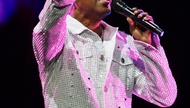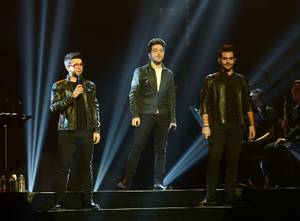Jon Anderson has been in Las Vegas many times during his five decades in the music business, but there’s one particular moment that remains lodged in his memory. “I met with divine energy there one time,” he recalls. “It was like angels came and said hello to me. And I wasn’t drunk or stoned. I’d just seen a great show by Frank Sinatra. I had a visitation and I thought, in Vegas?”
One could wonder if a similar sort of divine intervention has finally put the veteran vocalist back onstage with two former Yes bandmates, a dream come true for fans of progressive rock. Anderson is on the road with guitarist Trevor Rabin and keyboard god Rick Wakeman—the first time the trio has shared a stage in 25 years. Their new band, which they’re calling ARW, took several years to become a reality because of Rabin’s intensely busy schedule. There are plans to release new music, but they wanted to first get back to the thing that brought them together so many years ago. “We wanted to prove that the music we were playing, Yes music, is very ingrained in our hearts,” Anderson says.
I saw your show in Akron, Ohio, recently, and you guys really seemed to be having a lot of fun. That’s good that you saw us. I do a lot of interviews and try to explain what we’re doing, which is impossible, because it’s such a trip.
It seems like the band is in a pretty good place right out of the gate. How did it feel for you? Very surprising. You know, you get on the road and you just hope that everybody’s going to enjoy the show. The audience reaction was phenomenal. Wherever we’ve been, we’ve had these standing ovations and people wanting more after two and a quarter hours.
I joke with Trevor, because he came over and said, “Jon, you sang great tonight!” I said, “Look, you just played a million notes. Shut up!” (laughs) “I have no idea how they do it, especially Rick on his keyboards—how he plays that music all night is beyond me. But that’s the excitement of being onstage together.
You’ve said you wanted to take a fresh look at the classic material and tweak the arrangements. Did you get a chance to do much of that? Not as much as I’d like, but you know, you’re in rehearsal and you go through the tracks—“Rhythm of Love,” “Awaken” and songs like that—and you just try to expand a few things here and there. And then you get to that point in rehearsal where you’re stretching yourself too far and you finish up with three hours of music. You’re still not tight enough, so you tighten it up to two hours and you have to leave things out.
There are some real epics in the setlist, most notably “Awaken,” from Going for the One. What pulled you toward wanting to put that one in the setlist? Because it’s a challenge. To me, it’s one of the most interesting structures of Yes music of the ’70s. For me, it personifies what Yes was all about, a musical adventure, the sort of spiritual energy that surrounds us when we’re playing that music, the chord sequences. It’s not just a song; it’s an emotional event. And then at the end, the audience sort of rises and goes with us, and it’s a fantastic feeling.
I would imagine there’s some stuff in this set that has real significance for you personally, like that one and also “The Meeting” from the Anderson Bruford Wakeman Howe album. Yeah, I always have to take a very deep breath before I sing “The Meeting,” because it’s just me and Rick onstage and the sound of the voice and the piano. The words are very, very clear to me when I’m singing it. I remember writing it that night with Rick and wondering where it came from. It’s a very magical thing to sing.
Which Yes album would you say was the most difficult to record back in the day? They were all difficult (laughs). I can’t remember one that was easy. Making and creating something that you can call an album of music, it’s got to have so many ingredients for it to work. For a lot of musicians and productions, there are just two hit records and the rest is just filler, songs on an album. But The Beatles, they always created an album of complete music. Especially the White Album and then obviously Sgt. Pepper. There was something about what The Beatles did in terms of filling the album full of musical ideas that I constantly think about. I still work on that premise, that people buy an album not just for the one or two hits or the ones they hear on the radio, but for the whole experience.
There were a couple of crazy, difficult ones. Big Generator was tough, because we’d just had a No. 1 around the world, and everybody wanted another No. 1. And I wanted to do something totally different (laughs). You know, at that time, it was all business; that’s why I did ABWH, because I’d had enough of trying to make a hit record. I just wanted to make a good album of music.
Does it feel easier with ARW, more relaxed? Not really (laughs). We get on great, but you know, putting on a tour is never a clear-cut thing. You’ve got to go through a lot of trials and tribulations about the sound and lights and all of this kind of thing. You know, it’s always like that and then you go onstage and ta-da! Showbiz!
In terms of new music, is that something you’ll look to work on at the end of this tour? We have January and February to put together two or three songs. At the moment, I’m never quite sure whether to make albums anymore. I’m more interested in projects and EPs, like two or three songs at a time. You know, you can do two or three songs and then do a couple more in the summer and a couple more next winter, rather than trying to make an album.
What can you tell us about the new music that has been worked on? It’s very powerful, exciting stuff. I was a bit frustrated that we never got into it, but I realized that we had to get rehearsals done correctly and the staging done correctly. You know, I’m always a person that wants to do new stuff. I’ve got a new [album] called Invention of Knowledge, and I’m on my next album with another project that I did 25 years ago; we’re going to get that out sometime next year. So I’m always ahead of the game mentally and musically. Me and Trevor and Rick have written some really wild stuff. We’ve just got to get it down in the studio.
It also sounds like there are plans to document this tour with some sort of live release. We record every show, so each night you get two or three tracks. By the end of the tour we’ll have a couple of dozen versions of what we want. We’ll put it out somehow. ARW is good, and it should be a lasting event for a lot of people.
Bassist Lee Pomeroy does an incredible job honoring Chris Squire with his playing on these shows. He is so darn special. We call him The Oracle, because he knows everything about Yes. More than we do. It’s bizarre.
The seeds of Yes began with a meeting in a bar between you and Chris. What comes to mind when you think back to that moment? I said to Chris before he passed into the next adventure, “You know, without you, I wouldn’t be doing what I’m doing.” That moment in time was very special for me and for him as well, because we were both hovering around trying to figure out what to do next, and then all of a sudden, we started Yes and within a month we had [the band] going. We never knew how it was going to go, but we just enjoyed what we were doing. I think we didn’t have any specific dreams, other than going and getting better and better. And then we saw King Crimson and thought, “Whoa, sh*t! We’ve got to get better now!” (laughs) We saw their first gig in a club, and you’re thinking, “Oh, we thought we were good!”
What did you enjoy about working with him on music in those early days? That everything was fresh and open and we didn’t really have any barriers. We knew we were too old to be pop stars. We just wanted to be a great band with fresh ideas musically.
Yes has been nominated for the Rock & Roll Hall of Fame again this year. How much would it mean to you personally to get in? I always say it will happen when it happens, and I’m not going to hold my breath. It’s more for the fans now. The fans would love it, and of course, we would get up there and have a great time. But I’m not going to hold my breath. I’m just going to say that if it happens, that’s great and I’ll be there.
Anderson, Rabin and Wakeman November 19, 8 p.m., $46-$119. The Pearl, 702-942-7777.







